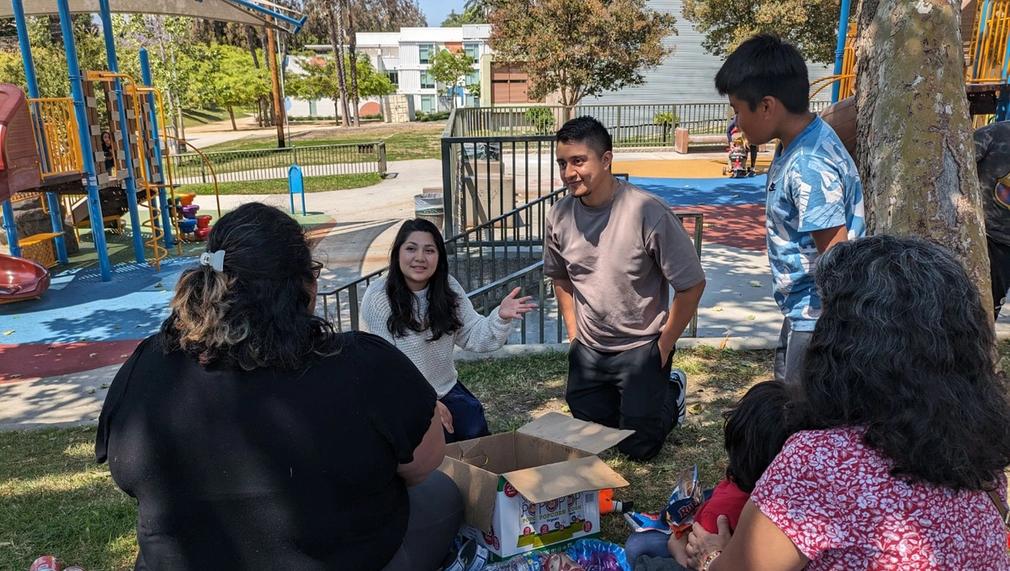Empowering Underserved Latino Families: Transforming Mental Health
Our vision is to revolutionize mental health care access and care for hardworking, uninsured/underinsured Latino families in South LA. Current mental health treatment options for the uninsured are extremely limited, inaccessible, and less effective. To address this critical need, we seek grant funds to mobilize a specialized cohort of Promotores, trusted messengers deeply rooted in the community, to increase access to care, educate the community on mental health and wellness, and assist in building self-healing communities.

What is the primary issue area that your application will impact?
Health Care Access
In which areas of Los Angeles will you be directly working?
South LA
In what stage of innovation is this project, program, or initiative?
Applying a proven model or solution to a new issue or sector (e.g., using a job recruiting software or strategy to match clients to supportive housing sites, applying demonstrated strategies from advocating for college affordability to advocating for housing affordability and homelessness, etc.)
What is your understanding of the issue that you are seeking to address?
In Los Angeles County, 2.2 million Latinos lack health insurance and do not qualify for Medi-Cal. While My Health LA has successfully enrolled over 94,000 uninsured residents, over 2 million individuals remain without coverage. The disparities in accessing mental health care among Latinos in LA County have reached unprecedented levels and are projected to worsen, particularly in areas that historically lack services for the uninsured and underinsured, such as South LA. For the Latino population, there has been a notable increase in rates of serious mental illness and major depressive episodes, indicating a need for mental health services.Treatment barriers, including stigma surrounding mental health disorders, language barriers, and a high rate of uninsured individuals, further impede access to care.Alarmingly, a substantial proportion of Latinos with serious mental illness or substance use disorders, approximately 56.8% and nearly 90% respectively, do not receive the needed treatment.
Describe the project, program, or initiative this grant will support to address the issue.
Navegando Unidos Para Un Nuevo Amanecer (N.U.N.A), our outreach program, aims to improve health equity for uninsured/underinsured Latinos in LA County. We will establish a trusted cohort of promotores to educate the community, reduce mental health stigma, and connect individuals to vital health, mental health, and social services resources. Using a relational model, we enhance relationships, address treatment barriers, and promote equitable care. The NUNA Promotores cohort, trained in mental health and substance abuse, will support bilingual individuals and families with severe mental illness, guiding them to free or low-cost services. They will provide information on healthcare programs, legal residency/citizenship applications, and supportive services for social determinants of health. Through 12 full-day sessions, Promotores will learn about trauma-based disorders, intervention strategies, and actively support clients in accessing initial mental health appointments. Peer specialists with lived experience will contribute to interdisciplinary treatment plans, ensuring inclusive care.
Describe how Los Angeles County will be different if your work is successful.
Our vision for success is to create transformative impact by reducing disparities, increasing enrollment and access to services, fostering healing and self-reliance, and empowering community members in LA County's uninsured/underinsured Latino population. We aim to increase Medi-Cal/CalAIM or My Health LA enrollment and address barriers to healthcare access. Through trained Peer Specialist Promotoras, we will advocate for better care and champion reduced mistreatment. Our program offers bilingual treatment teams, eliminating wait times and improving access to quality care. A significant aspect of our vision is the empowerment of community members to join as Promotoras and become leaders in health equity within their own Latino communities. By building a sustainable network of peer specialists and/or Promotoras, specifically trained in fostering self-healing communities, we envision active engagement in improving their own healthcare access and outcomes.
What evidence do you have that this project, program, or initiative is or will be successful, and how will you define and measure success?
To evaluate our program's success, we will employ various methods. Quantitative measures include tracking the number of individuals served and Promotores' community education presentations. We will monitor Medi-Cal/CalAIM and My Health LA enrollments, denials, and disenrollments. Additionally, we will measure the number of completed Promotor programs and those becoming peer specialists. Qualitative insights will be gathered through surveys, assessing mistreatment, misdiagnosis, and inappropriate care experiences. Process measures such as outreach event numbers, training completion rate, and adherence to protocols will ensure program fidelity. Our ultimate success will be determined by outcome measures, reflecting positive impacts on well-being, quality of life, treatment plans, health outcomes, reduced disparities, increased knowledge and awareness, and enhanced self-efficacy among participants.
Approximately how many people will be impacted by this project, program, or initiative?
Direct Impact: 2,400
Indirect Impact: 9,600